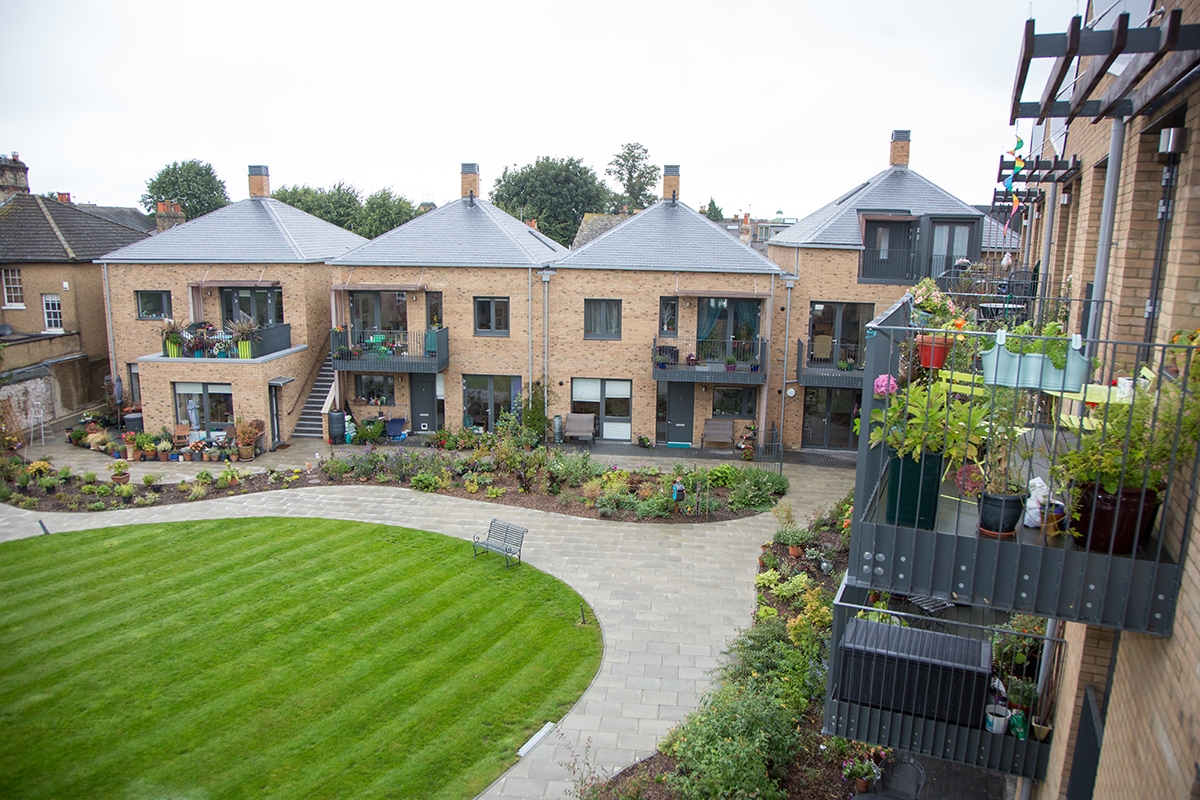You are viewing 1 of your 1 free articles
The Thinkhouse Review: is co-living a housing solution for vulnerable older people?
In our monthly look at housing research, Richard Hyde argues that a Cambridge Centre for Housing and Planning Research report on co-living is a “must-read” for the sector
Thinkhouse is a website set up to be repository of housing research. Its editorial panel of economists, chief executives, consultants and academics critiques and collates the best of the most recent housing research (scroll down for more information).
I am a ‘baby boomer’, just narrowly missing out on being a member generation X. Generation X sounds so much more exhilarating.
I feel more connected to someone whose collective awaking was more shaped by Margaret Thatcher than post-war rationing.
Baby boomers are often the focus of debates about the social care and housing consequences of the growing ageing population in the UK.
Consequently, I am instinctively drawn to ideas about what we as a nation can do to respond and, of course, I am also not keen on the likelihood that my final years may be marked by loneliness, isolation and struggling to find suitable accommodation.
So from a national perspective and my own self-interest, the report produced by the Cambridge Centre for Housing and Planning Research, funded by the Nationwide Foundation, into co-living (generations sharing communal facilities) stood out from the others that hit the Thinkhouse site last month.
What could be better to keep me feeling young and future-proofed than co-habiting with a millennial or a centennial? I am sure they would benefit from me being around during the day to receive their internet shopping.
“What could be better to keep me feeling young and future-proofed than co-habiting with either a millennial or a centennial?”
This report is a serious piece of research. Running to 85 pages, referencing more than 60 other reports from around the world and conducting new qualitative research into gaps in our understanding. But this is no dry academic tome. Valentine Quinio and Dr Gemma Burgess have created a report for someone like me (and probably many of our policy-makers?) who has attention span of a gnat. This is easily readable.
The report primarily focuses on a subset of co-living by examining three types of co-housing models (community-led governance and management) models.
Namely: co-housing communities that were either intergenerational or older people only, home share schemes in which an older person’s spare room was used by a younger person in exchange for support, and ‘link ages’ schemes that house older people with PhD students who provide support and companionship in exchange for cheaper rents.
The research explores the benefits, obstacles and regulatory frameworks which surround these models, and explores the role that various stakeholders, such as local authorities and housing associations, play in the development of co-living.
The research finds that the main benefits of co-living models are that older people make active choices about their later life, it provides them with support and companionship, and helps them to feel less lonely.
By enabling older people to stay in their own home through intergenerational one-to-one support or through joining a co-housing group, co-living may delay the need for further care – therefore bring benefits for families, social services and local authorities.
However, establishing co-living schemes is often costly and resource intensive. The report identified the need for extensive input of time and resources to establish and manage schemes – access to land and finance – but also general awareness and acceptance of sharing one’s living space in later life.
“By enabling older people to stay in their own home through intergenerational one-to-one support or through joining a co-housing group, co-living may delay the need for further care”
The role that local authorities and housing associations can have in developing co-living and the steps that can be taken to reduce the barriers to developing this form of intergeneration living is set out in seven policy recommendations covering increasing awareness, funding, guidance and support.
There should also be better consideration of land that has potential for co-housing development, in line with the “preferential access to land” systems used in other European countries and specific planning considerations which allow more time for co-housing groups to purchase sites instead of competing in the open market against private developers.
“Cambridge Center for Housing and Planning Research has produced an analysis that effectively explains that co-housing can be one of the answers to the housing and social care crisis”
I would have liked more analysis of co-living as well as co-housing models. In particular, intergenerational schemes, such a siting a nursery within a retirement home or village.
Recent fly-on-the-wall documentaries have shown how pairing residents with preschool children can have real benefits at both ends of the age spectrum.
While such schemes need careful management, they probably face lower legal and structural barriers than co-housing models. Despite this gap, Cambridge Center for Housing and Planning Research has produced an analysis that effectively explains that co-housing can be one of the answers to the housing and social care crisis. A must read for anyone with an interest in this subject.
Richard Hyde, chair, editorial panel, Thinkhouse
What is Thinkhouse?
Thinkhouse was formally launched in spring 2018, and aims to “provide a single location and summary of the best and most innovative research pieces, policy publications and case studies”.
It specifically looks at reports that propose ways to boost the amount and quality of housing and the economic, social and community issues of not doing this.
The Thinkhouse editorial panel highlights the ‘must-read’ reports, blogs about them and runs the annual Early Career Researcher’s Prize.
The panel includes current and former housing association chief executives, academics, lawyers, economists and consultants. It is chaired by Richard Hyde, chief executive of a business that sells construction hand tools.
Who is on the panel?
Richard Hyde | Chair of Editorial Panel, CEO of HYDE |
Gemma Duggan | Head of Compliance and Performance at Extracare |
Chris Walker | Economist |
Brendan Sarsfield | CEO, Peabody |
Mick Laverty | CEO, Extracare Charitable Trust |
Martin Wheatley | Senior Fellow, Institute for Government, |
Kerri Farnsworth | Founder & MD, Kerri Farnsworth Associates |
Suzanne Benson | Head of Real Estate for the Manchester office of Trowers. |
Burcu Borysik | Policy Manager at Revolving Doors Agency, |
Ken Gibb | Professor in housing economics at the University of Glasgow, Director of CaCHE |
Peter Williams | Departmental Fellow, Department of Land Economy, University of Cambridge |
Brian Robson | Executive Director of Policy and Public Affairs at the Northern Housing Consortium |
Francesca Albanese | Head of Research and Evaluation at Crisis |
Jules Birch | Journalist and blogger |
Susan Emmett | Head of Engagement for Homes England |
Mark Farmer | Founder and CEO Cast Consultancy |
Steve Moseley | Group Director of Governance, Strategy & Communications at L&Q |
Jennifer Rolison | Head of marketing at Aquila Services Group |
Philip Brown | Professor of Housing and Communities at the University of Huddersfield |
Anya Martin | Senior researcher at the National Housing Federation |
Emily Pumford | Policy & strategy advisor, Riverside |
Anthony Breach | Analyst, Centre for Cities |
Shahina Begum | Customer Insight Office, Peabody |












